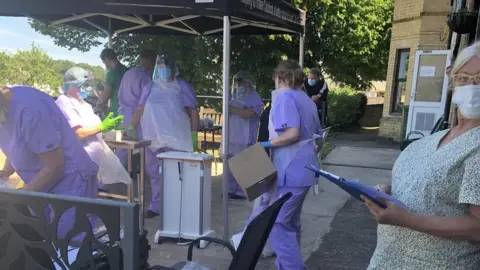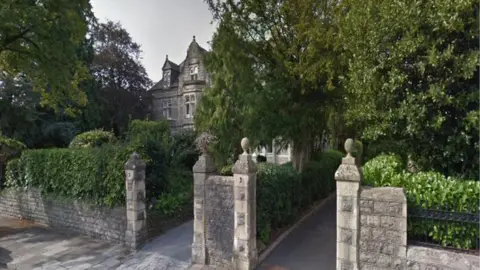Coronavirus: Welsh care homes 'badly let down'
 @mmowat1
@mmowat1Care homes have been "badly let down" during the coronavirus pandemic and the Welsh Government has been too slow to respond, a report has said.
The Senedd's health committee described Wales' testing policy in care homes at the start of the outbreak as "flawed".
It said it took "too long" to start "appropriate testing measures". Care homes account for 28% of Wales' 2,438 coronavirus deaths.
The Welsh Government said it did not accept residents had been let down.
"The Senedd's health committee has focused on testing, which is just one part of our response," a spokesman said.
"We have provided a wide range of support, including extra nursing staff where necessary and free PPE [personal protective equipment] for care homes across Wales."
How well Wales coped with the pandemic, including whether there was adequate PPE and effective testing policies was explored by the cross-party committee.
The crisis "exposed serious weaknesses that existed in many areas", its report said.
However, it added: "A second wave does not have to be inevitable if the lessons of the last few months are properly learned and fully applied."
Early in the outbreak, 1,097 patients were discharged from hospitals to care homes without being tested for Covid-19.
Care home residents with symptoms, and those being discharged from hospital, were not routinely tested until 29 April.
On 16 May it was announced that all residents and staff, regardless of whether they had symptoms, could be tested.
The committee points out this was "considerably later than both England (28 April) and Scotland (1 May)" took the same decision.
Wales' initial approach was "flawed, and... it was subsequently too slow in responding to the mounting crisis", the report adds.
It said: "We are deeply troubled by the number of Covid-related deaths in care homes. Care homes look after some of our oldest and most vulnerable members of society.
"They deserve to be protected in the event of a national health emergency, yet they have been badly let down during this crisis."
 Google
GoogleHealth Minister Vaughan Gething has said policies are based on scientific advice - and there was no evidence that discharging people from hospitals to care homes without tests led to more deaths.
But the report said decisions to reverse the original testing policy, later than happened in England and Scotland, came "at great cost to the social care sector".
The report also said there was a lack of PPE at the start of the outbreak and it was "extremely concerning" Wales has - at times - come within days of running out.
Other concerns included the fact vulnerable people who were asked to shield from the disease did not always get clear information and the UK-wide decision to abandon contact tracing early in the crisis was "devastating".
It said the Welsh Government should now make sure it has an "efficient and effectively functioning contact tracing system".
'Vulnerable people'
A Welsh Government spokesman said its approach had been "rooted in scientific evidence with the sole objective of saving lives, regardless of where people live".
"Everyone working in social care has worked tirelessly to protect some of the most vulnerable people in Wales," he added.
"We will continue to work with the sector to identify and provide any additional support it needs to respond to the virus."
Care Forum Wales, which represents the industry, said some of its members felt under pressure to admit hospital patients who had not been tested.
Chairman Mario Kreft said: "This report is essentially confirming what we knew already and what Care Forum Wales has been saying for months that essentially care homes, their residents and staff inadvertently became collateral damage in a drive to protect the NHS from being overrun."
